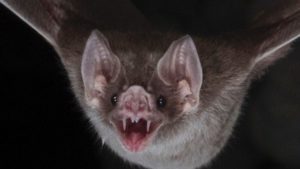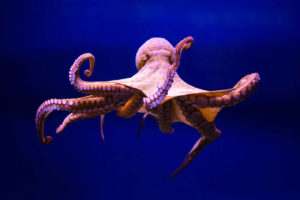If you conjure up a mental image of a vampire bat it will be unlikely to ooze the human virtue of empathy. Like their undead namesakes of gothic fiction, these tropical flying mammals make their living by biting necks by night and licking blood. Their teeth evolved sharper than surgical scalpels to avoid waking their sleeping prey, which by necessity need not to notice the ghastly intrusion.  But surreptitious neck biting is tricky business and if the high-metabolism bats fail to find a blood meal in as little as two nights, they risk starvation.
But surreptitious neck biting is tricky business and if the high-metabolism bats fail to find a blood meal in as little as two nights, they risk starvation.
That’s where their bat friends come in. Female vampire bats live in highly social colonies and researchers were surprised to learn that bats coming from a successful hunt will regurgitate small amounts of blood for their less fortunate compatriots, lessening the collective risk of starvation. Is this empathy or mere adaptation? Is there a meaningful difference between the two?
Scientists are beginning to question the sharp delineation between humanity and what are now being called “non human animals” In 2012, a group of prominent neuroscientists signed The Cambridge Declaration on Consciousness, which concluded:
“…the weight of evidence indicates that humans are not unique in possessing the neurological substrates that generate consciousness. Non-human animals, including all mammals and birds, and many other creatures, including octopuses, also possess these neurological substrates.”
 The octopus is about as non-human as you can get. Our last common ancestor was likely some kind of marine worm that lived around 750 million years ago. Knowing exactly what and when is complicated by the fact that this was over 100 million years before the fossil record started at the so-called Cambrian explosion when animals suddenly evolved hard parts like shells and bone.
The octopus is about as non-human as you can get. Our last common ancestor was likely some kind of marine worm that lived around 750 million years ago. Knowing exactly what and when is complicated by the fact that this was over 100 million years before the fossil record started at the so-called Cambrian explosion when animals suddenly evolved hard parts like shells and bone.
Biologically we also don’t share a lot of machinery. We have one heart; they have three. We have a spine and large central brain. Octopus have neither, with the majority of their neurons distributed in their eight arms. Severed tentacles will grope around in a gruesome zombie-like way for a disconcerting period of time.
Star Trek enthusiasts will appreciate that, like Mr. Spock, octopus blood uses copper instead of iron to transport oxygen giving it a greenish tinge. They are also venomous and change their color at will for camouflage or to display emotion. Their entire body is able to taste their environment. Octopus sex is involves the male inserting a specially adapted tentacle into the body cavity of the female and both sexes typically perish after procreation.
Their decentralized “brain” doesn’t seem to hold them back from solving complex problems like figuring out how to open a childproof container or climbing aboard a fish boat to steal crab from the ice locker.
In 2014, a New Zealand octopus named Inky made headlines by escaping the national aquarium one night by letting himself out of his tank, slithering across the floor and down a drainpipe to the ocean.
“I don’t think he was unhappy with us, or lonely, as octopus are solitary creatures,” said Rob Yarrell the aquarium manager. “But he is such a curious boy. He would want to know what’s happening on the outside. That’s just his personality.”
Someday we might find intelligent life elsewhere in the universe that has evolved entirely separate from us. Until then we can study the octopus.
Enumerating intelligence is hard enough among people. The standard IQ test has been often criticized as culturally biased towards the generally white wealthy children it was originally designed to evaluate. Nevertheless researchers have gamely tried to adapt similar tests for use on monkeys and apes with more glaring endemic differences than various varieties of humans. Now consider the challenges of extrapolating such a test for something a few phyla away like the octopus. Still science marches on.
Those obvious limitations aside, researchers who spend time studying individual octopus swear they display unique personality types even within the same species and often indulge in what appears to be play. Author of the book “The Soul of an Octopus” Sy Montgomery describes her first meeting with a captive octopus – an experience that changed her life:
"The first was named Athena and I met her at the New England Aquarium. The keeper opened up the top of her tank and I was surprised to see her turn red with emotion and slide over to greet me, and her eye swiveled in its socket and locked into mine. And then, her arms started boiling up out of the water ... I plunged my arms into the 47 F (8 C) cold water and her arms came up to greet mine and soon I was covered in all of these strong, white, supple suckers. I realized, not everyone would like this, but I was thrilled because as I petted the octopus on her head, she started to turn white, which is the colour of a relaxed octopus."
So interactive are these mollusks that zookeepers are required to abide by an octopus enrichment handbook that describes how their enclosures need to be enhanced avoid having their invertebrates become unethically bored. This involves making sure they have access to puzzles or other children’s toys – apparently Mr. Potato Head is a cephalopod favorite.
Why would an octopus want to play? A deterministic answer might be that it helps them socialize. But octopus live generally solitary lives and quite short ones at that – typically less than three years. Maybe they play because it’s fun. If true then these aliens-who-live-on-earth might make us begin to question just how special our human experience actually is.
Making friends with many an octopus was transformative for Montgomery, "They can know you and know you are different from this other person ... and that to me expands the moral universe quite a bit."
So what can we learn about AI from the octopus? At the very least it is remarkable how a species so different from ourselves seems to have evolved extraneous traits we once considered uniquely human. Would an AI also exhibit a personality? Curiosity? Wonder?
Lets indulge in a long stroll along a slender limb. Perhaps a natural progression is being hinted at. A solid scientific case can be made for emergent complexity in the cosmos. Life is likewise plausibly inevitable given the right conditions, based on the theoretical work of Jeremy England and evidence of complex life fossilized in rocks as old as 2.1 billion years.
Emergent intelligence is somewhat more of a long shot but has a fair bit of evolutionary evidence to back it up, including our octopus colleagues. Emergent empathy such as blood sharing among bats is potentially plausible though it might be extremely difficult to find a non-tenured professor willing to suggest such a thing.
An anonymous blog however affords the longest of philosophical leashes; a forum to explore such presumptive concepts as emergent mirth and mathematical morality.